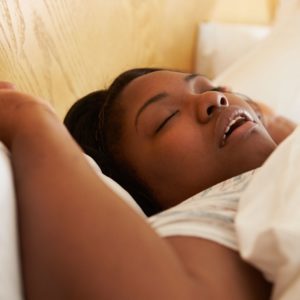
What is Sleep Apnea?
Sleep apnea is the term used to describe a group of conditions that affect respiration during sleep. The most common form is obstructive sleep apnea, which involves airway closure due to pressure on the throat from surrounding tissue. Another form, central sleep apnea, occurs when the brain does not signal the respiratory muscles to breathe. Then there is a mixture of the two, referred to as complex sleep apnea. In any case, a person experiences a brief or prolonged pause in breathing during sleep.
Signs of Sleep Apnea
We cannot only look at snoring as a symptom of sleep apnea, though it is one of the most common signs. The problem with this limited examination of symptoms is that people who have sleep apnea snore, but not all people who snore have sleep apnea. Therefore, we must look and other signs.
- Dry mouth or sore throat. A person with sleep apnea may gasp for air or work harder to draw in air. This can lead to dryness in the mouth and throat. Soreness may be especially prominent in the mornings.
- It is not uncommon for people with sleep apnea to experience chronic headaches. They are usually at their worst first thing in the morning. It is believed that headaches could be caused by low oxygen levels in the bloodstream
- Mood changes. Sleep apnea can severely degrade a person’s quality of sleep. Sleep deprivation has been shown to disrupt the chemical balance in the brain, which can make it difficult to manage emotions.
- Decreased sex drive. The chemical changes and fatigue that result from sleep apnea can negatively affect sex drive.
- Chronic fatigue and sleepiness. It is not difficult to understand why a person with sleep apnea would be tired during the day. While sleep may not be completely disrupted by apnea episodes, the depth of sleep is significantly altered. The repeated influx of adrenaline throughout the night prevents a person from resting well.
At the Sleep Apnea and Snoring Center in St. Louis, our patients can expect to receive care that achieves results. To schedule your consultation, call 314-450-7720.

